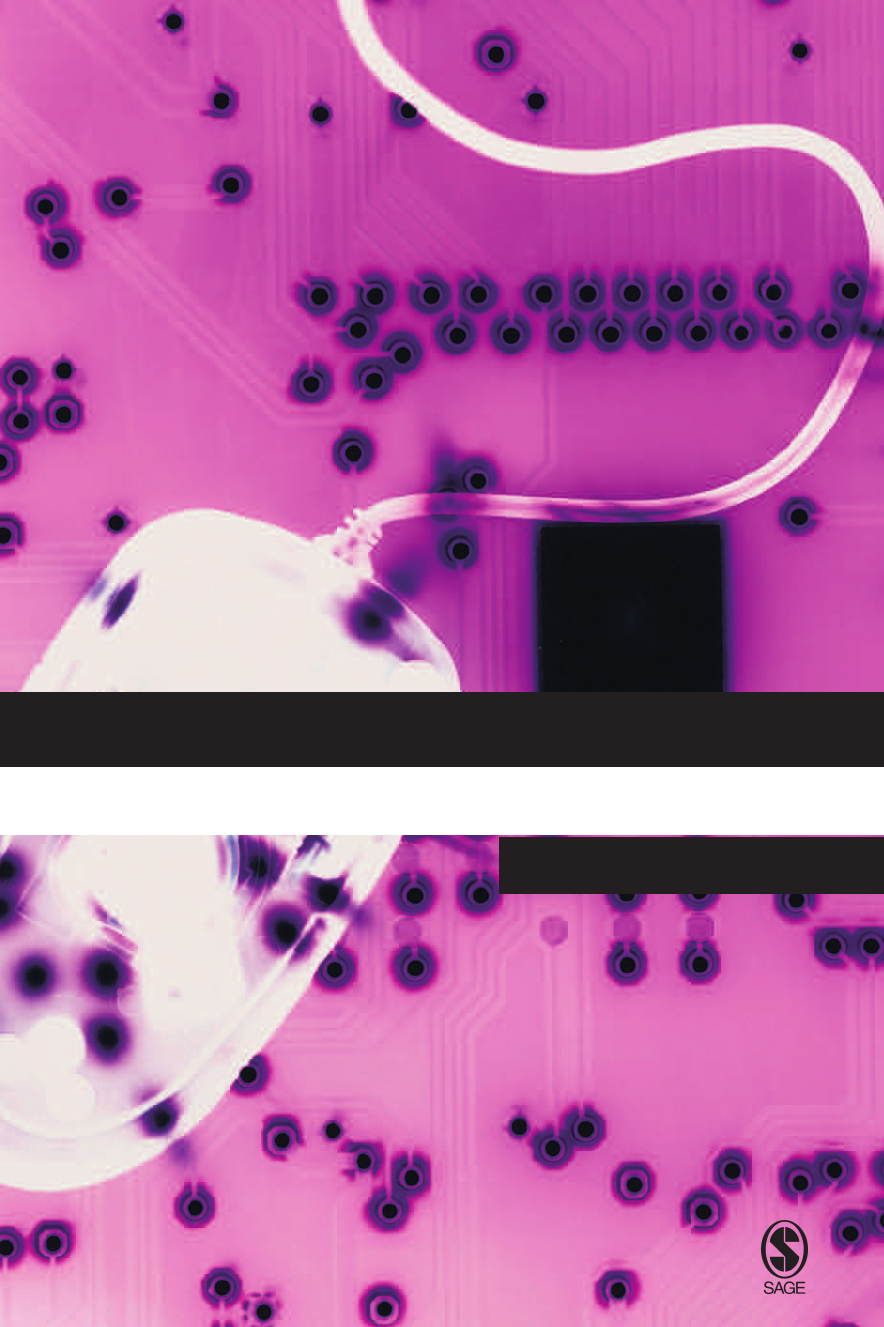
Practical Journalism
How to Write News
HELEN SISSONS
Practical Journalism
Sissions-Prelims.qxd 9/26/2006 5:34 PM Page i

Sissions-Prelims.qxd 9/26/2006 5:34 PM Page ii

Practical Journalism
How to Write News
Helen Sissons
●●
SAGE Publications
London Thousand Oaks New Delhi
Sissions-Prelims.qxd 9/26/2006 5:34 PM Page iii

© Helen Sissons 2006
First published 2006
Apart from any fair dealing for the purposes of research or
private study, or criticism or review, as permitted under
the Copyright, Designs and Patents Act, 1988, this publication
may be reproduced, stored or transmitted in any form, or
by any means, only with the prior permission in writing of
the publishers, or in the case of reprographic reproduction,
in accordance with the terms of licenses issued by the
Copyright Licensing Agency. Enquiries concerning
reproduction outside those terms should be sent to
the publishers.
SAGE Publications Ltd
1 Oliver’s Yard
55 City Road
London EC1Y 1SP
SAGE Publications Inc.
2455 Teller Road
Thousand Oaks, California 91320
SAGE Publications India Pvt Ltd
B-42, Panchsheel Enclave
Post Box 4109
New Delhi 110 017
British Library Cataloguing in Publication data
A catalogue record for this book is available
from the British Library
ISBN-10 0-7619-4926-7 ISBN-13 978-0-7619-4926-8
ISBN-10 0-7619-4927-5 (pbk) ISBN-13 978-0-7619-4927-5
Library of Congress Control Number: 2005938005
Typeset by C&M Digitals (P) Ltd., Chennai, India
Printed on paper from sustainable resources
Printed and bound in Great Britain at the Alden Press, Witney
Sissions-Prelims.qxd 9/26/2006 5:34 PM Page iv

CONTENTS
Acknowledgements xi
Introduction xiii
1 The Journalist 1
Being a journalist 2
What makes a good journalist? 3
The digital newsroom 15
Is journalism for you? 16
Case study: My career as a journalist by John McIntyre 18
Summing up 20
Review questions 21
Exercises 21
Further reading and resources 21
Notes 21
2 What is News? 23
Some thoughts 23
News values 24
Other influences 30
News is relative 32
Objectivity 33
News sources 34
Case Study: News agenda at BBC Radio 4’s World at One 37
Summing up 38
Review questions 38
Exercises 38
Further reading 39
Notes 39
v
Sissions-Prelims.qxd 9/26/2006 5:34 PM Page v

3 Telling the Story: Grammar and Style 41
Putting the message across 42
Good writing – some rules 42
The do’s 42
The don’ts 46
Common grammatical errors 50
Poor spelling 54
Summing up 55
Review questions 55
Exercises 56
Further reading 56
Notes 56
4 Structuring the Story 57
The intro/cue 57
Identifying the intro 58
Writing the intro 62
Breaking stories and breaking the rules 64
What to avoid 66
The ideal intro 68
Structuring the story 68
Case Study: A reporter’s thoughts on structuring a story 68
The news triangle 70
News questions 73
Transitional words 73
Paragraphing 74
Attribution 76
Balance 77
Laying out copy 77
Summing up 78
Review questions 78
Exercises 78
Further reading 79
Notes 80
5 Writing for Broadcast 81
Introduction 81
The purpose of broadcast news 81
The language of broadcast news 82
Contents
vi
Sissions-Prelims.qxd 9/26/2006 5:34 PM Page vi

Writing the cue 86
Read your copy aloud 87
Going live 88
Part One: Radio 91
Using sound 91
Radio audiences 92
Types of programmes 93
Building a news bulletin 94
Case Study: Building a local news bulletin 94
Writing for radio 96
Case Study: Writing radio news 97
Script layout 100
Sounding the part 101
Editing sound 102
Part Two: Television 103
Using pictures 103
The television audience 103
Radio stories vs television stories 104
Writing for television 104
Case study: Writing for television as a foreign correspondent 107
Pieces to camera 112
Making the most of the pictures 114
Technology 117
How impartial? 122
Looking and sounding the part 124
Case study: The television reporter at work 125
Summing up 132
Review questions 133
Exercises 133
Further reading and resources 133
Notes 134
6 Online Journalism 135
News on the internet 135
The online journalist 138
The audience 140
Writing online 142
Selecting the facts 146
Newsgathering and researching using the web 146
Contents
vii
Sissions-Prelims.qxd 9/26/2006 5:34 PM Page vii

Summing up 152
Review questions 152
Exercises 153
Further reading and resources 153
Notes 154
7 Effective Interviewing 155
How important? 155
Types of interview 156
Two famous examples 157
Preparation 160
Case Study: The television interviewer 162
The interview 163
Taking notes 173
Covering news conferences 175
Doorstepping 176
Telephone interviews 177
Email or submitted question interviews 179
Ethical issues 179
Case study: The radio interviewer 182
Summing up 183
Review questions 183
Exercises 183
Further reading 184
Notes 184
8 Finding the News 185
Sources of news 185
Gathering the facts 195
Handling a news release 197
Case study: How to handle a press release 199
Human interest stories 202
Journalism by numbers 203
Case study: A radio reporter tracks down a story 206
Summing up 207
Review questions 207
Exercises 208
Further reading 208
Notes 208
Contents
viii
Sissions-Prelims.qxd 9/26/2006 5:34 PM Page viii

9 Local Government Reporting 209
Why local government is important 209
Local government structure 211
How councils work 212
The role of the councillor 214
Reporting local government 216
The Local Government Act and council meetings 217
Writing your report 219
Case study: Unearthing news stories from council planning agendas 220
Freedom of information 222
The nations and regions 223
Summing up 223
Review questions 223
Exercises 224
Further reading and resources 224
Notes 224
10 Court Reporting 226
The structure of the court service 227
Covering the criminal courts 230
Restrictions on reporting 232
Contempt of court 233
Other ways of falling foul of contempt 237
Reporter’s rights in court reporting 238
Ethical issues 238
Contempt in civil proceedings 240
Examples of crime reporting 240
Summing up 242
Review questions 243
Exercises 243
Further reading and resources 244
Notes 244
11 Reporters and the Law 245
Law and the media 244
Defamation 246
Libel and the internet 257
Contents
ix
Sissions-Prelims.qxd 9/26/2006 5:34 PM Page ix

Data Protection Act 1998 260
Human Rights Act 1998 261
Law of breach of confidence 263
Injunctions 265
Official Secrets Acts 1911 and 1989 265
Freedom of Information Act 2000 267
Trademarks 269
Summing up 269
Review questions 270
Exercises 270
Further reading 270
Notes 271
12 The Moral Maze 273
An ethical job 273
Objectivity/impartiality 276
Regulation in the industry 279
Regulating the broadcasters 279
Regulating the press 282
The Press Complaints Commission 283
Some practical issues and how to handle them 284
Summing up 295
Review questions 295
Exercises 296
Further reading and resources 296
Notes 297
Appendix: The Editors’ Code of Practice 299
Glossary 304
Index 313
Contents
x
Sissions-Prelims.qxd 9/26/2006 5:34 PM Page x

ACKNOWLEDGEMENTS
I have been amazed at how positively colleagues in the media have responded to this
project. My thanks to all the journalists who have given their time and the benefit of their
experience. They have, without exception, talked candidly and honestly about their
work – its pressures, its high points and its low points. Their wisdom appears throughout
the book explaining examples, recounting anecdotes or giving advice. Without them this
book could not have been written, as it was a project born out of the belief that only those
at the coalface can teach others how to mine.
Many of the journalists quoted are friends and former colleagues. Others responded to
a phone call or email from a complete stranger asking if they would mind being stalked
while they went about their duties and asked dozens of obvious or impertinent questions.
Among the latter the staff at 2BR radio station in Burnley, those at Ananova online
newsroom in Leeds and the Craven Herald newspaper in Skipton stand out as being par-
ticularly helpful. But thanks to all the staff at the newspapers, radio stations, online organ-
isations and television stations who tolerated my visits and endless questions or willingly
passed on information, graphics and other material.
Of my friends and former colleagues there are some who need special mention. At the
BBC Jo-Anne Pugh’s encouragement, inspiration and sound advice were invaluable and
Cathy Killick’s patient reading of the text and her sensible suggestions were much appre-
ciated. Gillian Hargreaves, Geeta Guru-murthy, Tom Symonds, Peter Sissons, Denise
Wallace, Sophie Raworth, Jon Williams and John McIntyre helped with extended inter-
views, advice and insights as well as reading and commenting on chapters.
Thanks too to others who frankly shared their thoughts and to the BBC management
who allowed me to spend days hanging round newsrooms in London and the north.
I owe a huge debt of gratitude to Shelley Bradley, a solicitor with the BBC who
responded to a phone call out of the blue and agreed to read the law chapters (without
pay). Her detailed suggestions and corrections were gratefully received. Any remaining
mistakes are mine.
Elsewhere, thanks to Mike McCarthy of Sky for the time I spent in the Northern
Bureau. To one of my first editors, Bob Bounds of the Kentish Gazette, who answered
pages of questions patiently and with the kind of sagacity only one who has nurtured
many young reporters would be able to provide.
xi
Sissions-Prelims.qxd 9/26/2006 5:34 PM Page xi

Warm thanks to my former colleagues at the University of Leeds who helped me make
the transition from hack to reflective practitioner and teacher. Among them Judith
Stamper, Dr Graham Roberts, Dr David Gauntlett and Prof. Philip Taylor stand out.
I thank also my former students who gave me six rewarding years and highlighted the
common challenges faced by young journalists. It is with them in mind that this book was
written.
Credit goes to John Sissons for his perseverance in reading and re-reading the proofs,
catching errors and repetitions and saving me from much embarrassment.
To Paul Denny for his help with Chapter 6 on online journalism and for rescuing early
copies of the script from the computer when I carelessly fed it several cups of tea.
I am grateful to my editors at Sage – Julia Hall and Jamilah Ahmed – for asking me to
take on the project in the first place and then encouraging me all the way. I've enjoyed
the journey immensely.
Finally my thanks are due to the many newspapers, internet sites, radio and television
bulletins from which I have quoted. Every attempt has been made to obtain permission
to reproduce copyright material. If any proper acknowledgement has not been made, we
would invite copyright holders to inform us of the oversight.
Practical Journalism
xii
Sissions-Prelims.qxd 9/26/2006 5:34 PM Page xii

INTRODUCTION
Journalists are like horses. You can define what a horse is, but when asked what's
their task, you’re trying to define everything from a Shetland pony to a racehorse.
(Jo-Anne Pugh, home news desk editor, BBC News, London)
The working journalist is not a homogeneous beast. There are myriad hybrids to the
breed. You have the monthly women’s magazine writers penning their lifestyle features
and listing the ten best lipsticks/handbags/places to have sex. There are the monthly
men’s magazine writers with their lifestyle features and ten best gadgets/ties/places to
have sex. There are the newspaper columnists taking their ‘sideways’ look at life/politics/
latest fad diet. The travel reporters describing the horrors of flying with four kids or wan-
dering down yet another impossibly narrow alley in yet another Mediterranean town; the
motoring correspondents; real estate writers and so on.
Then there are the news journalists. They are what this book is primarily concerned
with. Even here there are different varieties. You have the crime reporter of the metro-
politan daily. The stories they cover will be a world away from those tapped into the
screen of the staff writer at trade magazine Builder’s Week or those of the online journal-
ist for an activist website. You have the badly paid junior on a local weekly paper cover-
ing their first parish council meeting after a day of writing articles from golden weddings
to the hiring of a new lollipop lady to the closure of the sub post office. Their life is very
different from the senior correspondent on a regional television station who covers one or
two stories a day and may have a researcher working alongside.
Yet a journalist who starts on a local newspaper can move to a specialist trade publica-
tion, or to a monthly glossy, or into broadcasting. Perhaps they stay as a print journalist
but must file, in addition to copy, pictures or audio or any combination of these to the
online site of their paper. Good journalists need to be able to move easily between
different media and be comfortable reporting and presenting their stories to whatever
channel is required.
Practical Journalism: How to Write News introduces the beginner to the skills needed to
become a journalist. There are chapters covering interviewing and research techniques
and news writing. Further chapters cover working in broadcasting and online. Throughout
xiii
Sissions-Prelims.qxd 9/26/2006 5:34 PM Page xiii

the book we hear from practising journalists. They share their thoughts on the profession
and we watch them work – selecting stories, carrying out interviews and writing scripts.
Learning to interview effectively, report accurately and then to write in a manner that
is not only truthful but is also attractive to read or listen to is difficult. It would still be a
challenge if journalists were paid handsomely, worked in plush offices and had acres of
time to complete their tasks. But they don’t. They work to tight deadlines, in cramped
offices, often for poor pay.
They can also be physically or verbally threatened by governments and other powerful
interests wishing to prevent publication of embarrassing or damaging stories.
1
Despite the challenges, young people still want to join the ranks of the more than
70,000 journalists practising in the UK.
2
Why? Some think it’s glamorous (it’s not);
others enjoy writing. The best join because they want to know what’s going on and to tell
people about it, and because they realise news is not an optional extra for society. It is only
with reliable information that people can keep abreast of events and monitor those in
power.
It also has to be said that on the whole journalists love what they do. I was told many
times during interviews for the book that it is ‘one of the best jobs around’, and it’s hugely
enjoyable having ‘a front seat at the making of history’ and what a privilege it is to write
the ‘first draft’. Clichéd, but the message is clear. Studies too have found most journalists
to be satisfied with their choice of profession.
3
We may be happy being reporters, but is anyone interested in reading or listening to
what we do? Yes, they are. In Britain, people spend more time consuming the media than
doing anything else except work.
4
News fulfils a fundamental human need to keep up
with the latest gossip and important events. And good journalists have always been in
demand. Since the earliest times people have shared news and desired that its tellers be
accurate and entertaining.
5
Today, news is being shared as never before, with new technology ensuring that break-
ing stories can travel around the world in seconds. Reporters from Britain could be
covering a story in Pakistan for a news outlet in New Zealand. It is more than ever a time
when the people need to be able to rely on the supply of information as reliable, accurate
and independent.
Most journalists believe they work honestly and ethically, but few can explain how they
come to their decisions and others admit to coming under pressure early in their careers
to behave in ways they found unacceptable. This book looks at how journalists can work
more ethically and provides a guide for those starting out.
I have approached the writing of the book as one that will be relevant to news journalists
no matter what medium or media they aspire to work in. It is meant to be easy to read and
to understand. The chapters are self-contained and able to be read on their own, so readers
can dip in where they wish. Chapter 5, which covers broadcasting, is very long. For this
reason it is divided into three parts that can be read separately: an introductory section, a
section on radio reporting and a section on reporting for television. Each chapter concludes
with activities for students and trainees and a list of further reading and useful websites
for each topic. There is also a glossary of terms at the end of the book.
Practical Journalism
xiv
Sissions-Prelims.qxd 9/26/2006 5:34 PM Page xiv

The book draws on interviews with dozens of working journalists; these are found
throughout the text in the form of numerous unattributed quotes. Many are my former
colleagues who have generously given their time and from whom I have brazenly stolen
their best lines and ideas. To them my wholehearted thanks.
Keeble, R., Ethics for Journalists, London: Routledge, 2001.
Kovach, B., and Rosenstiel, T., The Elements of Journalism, London: Atlantic Books, 2003.
Lloyd, J., What the Media Are Doing to Our Politics, London: Constable, 2004.
Notes
1 Reporters without Borders, ‘The deadliest year for a decade’: 53 journalists killed. See www.rsf.org.
2 There were around 70,000 practising journalists in the UK in 2002 and the number was expected
to rise. Press Gazette, 12 July 2002.
3 Ibid.
4 John Lloyd, What the Media are Doing to Our Politics, London: Constable, 2004, p. 9.
5 B. Kovach and T. Rosenstiel, The Elements of Journalism, London: Atlantic Books, 2003, p. 9.
Introduction
xv
FURTHER READING
Sissions-Prelims.qxd 9/26/2006 5:34 PM Page xv

Sissions-Prelims.qxd 9/26/2006 5:34 PM Page xvi

1
1
THE JOURNALIST
Good journalists enjoy finding things out and then telling people what they have
discovered. At work the journalist will
• ask the questions to which the public want answers
• persevere to find the truth of events
• be accurate and balanced when constructing the story
• present it in the clearest and most powerful way
• have an extensive network of sources.
Journalism is full of lying, cheating, drunken, cocaine-sniffing, unethical people. It’s a
wonderful profession. (Piers Morgan, then editor of the
Daily Mirror,
quoted in
GQ
, April
2002)
When journalists of my generation first entered newspapers in Britain in the 1980s, there
was still a suspicion of graduates among news editors. Graduates were considered soft,
lacking in life experience and practical common sense and, worse still, they were seen as
expecting special treatment. On my first local paper there were journalists without
degrees, some with no A-levels. Journalism was seen as a craft, which was more about
natural instinct and talent than it was about education. A journalist, or ‘hack’, was a hard-
bitten operator who could smell a story at 200 paces and was not averse to the odd ques-
tionable practice to sniff it out.
There are still editors around who adhere to this view, but when I joined the BBC a few
years later, all the recent entrants were graduates. Many things were changing. No longer
were newsrooms full of the clatter of typewriters and there were no hunching, chain-
smoking, hacks stinking of booze (although this was always a stereotype beloved of
Hollywood and Broadway).The journalists I work with are more likely to go running than
Sissiions-3432-Ch-01.qxd 9/26/2006 5:36 PM Page 1

drinking at lunchtime and the classic view of the journalist as grubby, hard-drinking and
lacking in any of the social graces is incorrect, at least most of the time.
Some of the changes no doubt can be put down to new and faster technologies and we
will be talking more about these later in the chapter. It is now possible to transmit a report
from the most remote parts of the globe and have it on air minutes later. This is exciting,
but it is also a challenge to the journalist who has little time to assess the significance of
an incident or situation before they have to explain it to the general public. In addition,
the online news organisations and 24-hour broadcast news channels press for constant
updates, presenting huge demands (and opportunities) for the journalist.
Being a journalist
Journalism is about telling real-life stories and explaining the world beyond a person’s
direct experience. Good journalists shine lights where the public cannot see, they bring
knowledge where there was ignorance and, if they are very good, empathy where there
was antipathy and action where there was inertia.
The journalist gathers facts about the story; decides which of those to include and
which to omit; how to structure the story and which words to use to tell it. But it is all a
waste of time if they fail to communicate what they have found to the audience. If
nobody is reading or listening or watching, then the journalist cannot inform, educate or
enthuse. Therefore we have to find stories that people will be interested in and tell them
in the most exciting but truthful way possible.
In essence the journalist is a pedlar of information. It has to be packaged attractively to
be inviting to the reader, listener or viewer and it has to be accurate and fair to be a quality
product. And journalists share many of the same characteristics whether they are weekly
newspaper reporters covering council meetings, journalists on regional evening papers writ-
ing about important court cases, national radio reporters covering Parliament, or writers on
a broadsheet or compact reporting a natural disaster on the other side of the world.
That is not to say that all working journalists are conscientious or moral.There are those
who are sloppy and as lazy as, for example, the one who admitted to colleagues that when
he worked on a national tabloid newspaper he would sometimes make up quotes rather
than go out and collect them. He could predict, he said, what people would say. There are
those who also take the credit for other people’s work and those who abuse the trust of
interviewees by lying about their true intentions, even stealing photos of loved ones once
they have conned their way inside the house. I wish I could say these people do not pros-
per in the profession, but many do. So let’s not be starry-eyed.
If journalism is to remain a profession that people can rely upon to help them make
decisions about their lives, then journalists must resist the temptation to create content or
alter the tone of an article. The latter can be particularly hard to resist.
Journalists can come under pressure from editors to ‘jazz up’ their accounts. And there
are owners and advertisers who want to influence what is written (see Chapter 2). Many
Practical Journalism
2
Sissiions-3432-Ch-01.qxd 9/26/2006 5:36 PM Page 2

journalists work on under-resourced newspapers, internet sites and radio stations, and
have little time to check out stories. Some rarely get out of the office and must conduct
nearly all their interviews over the telephone.
But good journalists are badly needed. Public confidence in journalists and their journal-
ism is at rock bottom. The exposure of Jayson Blair, the New York Times reporter found to
be fabricating stories, and the fallout from the Hutton Inquiry into a BBC journalist’s report
that the Government made false claims in its dossier on the threat from the then Iraqi
President Saddam Hussein’s supposed weapons of mass destruction (WMD) have only
added to public suspicion of the media. (See Chapters 5 and 12 for more about these cases.)
An ICM poll for the National Council of Voluntary Organisations in July 2002 found
that half of the 1,000 people questioned believed journalists would not be honest when
interviewed.
1
Moreover, research by the University of Leeds shows that while people rely
heavily on the media for information, most of them distrust the media’s motives and
operational methods.They feel the news organisations are ‘just looking for a story’ and are
driven primarily by circulation and audience figures. The scepticism affected all media,
but mostly the press, and the tabloid press in particular.
2
The media ethics organisation,
PressWise, reports that around 10,000 complaints a year in Britain are being made to
regulatory bodies by people unhappy about what is reported about them.
3
Yet journalists need the public to trust them, otherwise the very reason for their
existence – to inform – is negated. Fortunately, despite poor pay, long hours and often
difficult working conditions, there are excellent journalists doing sterling work. Most
would not want to do any other job, because for anyone who wants to be where the action
is, it is the best work going.
What makes a good journalist?
So what qualities does a good journalist need? It has to be noted that in talking to jour-
nalists while researching this book, many found it quite a challenge to explain how they
do their job and what it is that makes them effective. For most practitioners, journalism
and the skills needed to recognise and report news become over the years instinctive.
However, when pushed they came up with the following qualities: being a people person,
a questioner, a verifier, accurate, persevering, courageous, a good judge of news, curious,
an able writer, creative, competitive, ethical, fair, balanced, objective, cultivating of con-
tacts, well informed.
A people person
Journalism often involves dabbling in the stuff of other people’s lives.
4
Good journalists
do so responsibly and ethically.
Journalists have a fascination with the affairs of men – they are people-watchers and
many love nothing better than sitting alone in a café or on a bus listening to other
The Journalist
3
Sissiions-3432-Ch-01.qxd 9/26/2006 5:36 PM Page 3

people’s conversations. As well as being good listeners, journalists should be good
communicators, able to deal with a wide variety of people and situations, from cabinet
ministers to homeless people.They should be sensitive to people’s feelings and able to win
their confidence while recognising the news angle and pursuing it.
A questioner
The journalist wants and needs to know everything they can about the events on which
they report or the issues that catch their interest. They must be full of questions and
intent on establishing as many facts as possible. Sometimes that means asking a string of
questions until the crux of the matter is clear, as only by understanding can they pass on
the story to the general public.
Never be afraid to ask the obvious question, even if it makes you look stupid, says Mike
McCarthy, bureau chief at Sky News in Manchester, who spent time covering the war in
Afghanistan in 2001:
When I arrived in Kabul, I had to go to a military briefing in a hotel. I got there a bit
late and missed the introductions so I didn’t know the name of the man leading the
briefing who was also the military commander. I absolutely had to know his name,
because it was a very important fact. For one thing, I didn’t want to get caught out on
air speaking live to a presenter and not know who had given out the information I was
referring to. So I asked his name, I did feel stupid but not as stupid as I would have
looked had I not known on air.
There are two lessons here – one is having the courage to ask and the other is being punc-
tual. As Mike himself points out, if you arrive late to the event, as a journalist you are
likely to miss the main story.
Accurate/a verifier
Asking questions is often to do with verifying the facts, not only questioning the people
but questioning what they tell you. Always be sceptical of what people say and be
willing to ask yourself why they are saying it. Never just accept what you are being told,
especially by governments – even more so if those governments are at war.
Journalists have a duty to do all they can to present as accurate a picture as possible to
the public. Every journalist I spoke to considered accuracy to be crucial. Ian Lockwood,
editor of the Craven Herald in Skipton, says that journalists are often unfairly accused of
making mistakes:
People have to have some confidence that what they’re reading is correct. There are
some who believe there are lots of mistakes, but actually there are very few. For exam-
ple, last week we wrote about a local boy who had a part in a television programme.
We said he’d got the part because he could play the piano and he had curly blonde
Practical Journalism
4
Sissiions-3432-Ch-01.qxd 9/26/2006 5:36 PM Page 4

hair. His grandmother rang up and said we’d got it all wrong. Yet when we went through
it line by line there was actually nothing wrong. The problem for the grandmother was
that she believed we’d implied he’d only got the part because of his piano playing and
blonde hair, not because he could act.
In the era of instant news, getting it right all the time is becoming harder to achieve. Derek
Crawshaw, who spent several years as a BBC 5-Live reporter in Belfast, explains that work-
ing for a station that prides itself on its ‘live’ nature gives the reporter special problems:
You have got to be there, be first and be live. But there are times when it’s difficult to get
as much information as you’d like. You have got to be secure and confident in knowing
that what you’re saying is correct and you’ve got to be confident enough to say ‘I don’t
know enough yet’. You come under great pressure as a live reporter to go on air. You’ve
got to be first and be accurate. It’s an easy thing to say, but it’s a hard thing to do.
Being able to say to a news editor that you’re not ready to go on air or to hand in a story
is an important part of the job of a reporter. Never publish facts you are not certain of but
find out as much as possible in the time available.
By striving to uncover what you can, the journalist discharges their duty towards the
people who cannot be there themselves, says Cathy Killick, a television reporter with BBC
Look North in Leeds:
There was a bad crash on the A1. Hundreds of vehicles were involved. I knew nobody
would know exactly how many, so with the help of a reporter from the
Yorkshire Post
newspaper I counted them. We found it was 600 vehicles spread over three-quarters
of a mile of motorway. You could see the chaos from the pictures, but I wanted to ver-
ify the facts. I had the time; often you don’t in this sort of situation. I think this is what
my job is about. I am the eyes and ears of the public and I want to get it right. To do
this you have to apply yourself.
Persevering
Without perseverance, a news journalist will never uncover anything but the most run-of-
the-mill stories.
You have got to have your quarry in view and to keep going and get it or as close to it
as you can. So you don’t fall at the first hurdle, you don’t knock on someone’s door
and if they don’t answer think that person isn’t in and give up. You leave a note, you
try someone else who may be able to help you, you go back later. (Cathy Killick, BBC
Look North
)
However, never mistake persistence for harassment. A journalist should not try to obtain
information through intimidation.
The Journalist
5
Sissiions-3432-Ch-01.qxd 9/26/2006 5:36 PM Page 5

For some journalists it was determination that secured them a job in the first place.
I was told by one foreign editor that as a young journalist he sat on the steps of the
newspaper’s building and accosted the editor every day until he agreed to take him on and
give him a chance.
Persistence by the editor of a local paper resulted in freedom for a man wrongly con-
victed of murder. It took Matlock Mercury editor Don Hale nearly eight years of cam-
paigning and investigating until he won an appeal hearing for Stephen Downing. The
Court of Appeal quashed the conviction and Downing was freed after serving 27 years in
jail for the murder of a Derbyshire woman, Wendy Sewell.
The miscarriage of justice that put Stephen Downing, then only 17 years old, behind
bars came to light only because Don Hale decided to go against the advice of his superi-
ors and investigate. By then Downing had been in jail 20 years and the case was largely
forgotten. Hale’s investigations found that although Downing had admitted the murder,
he had a mental age of 11 and had told his father that he only admitted it so he could go
home. Hale also discovered new witnesses who said they’d seen another bloodstained man
leave the graveyard on the night of the murder.
When Don Hale started publishing stories about his findings, he suffered threats and
intimidation and he was nearly killed by a speeding sports car, but he didn’t give up. He
said the intimidation only strengthened his belief that he was on the right track.
I can think of nothing more frightening than to be locked away for life for a crime you
haven’t committed. Who can you turn to? Who is prepared to listen to a convicted
killer? I was continually told that it was not my job to take on this sort of challenge.
So whose job was it? Who else was prepared to endure years of persecution?
5
Courageous
Journalists need courage in many situations. Sometimes it is the courage to go where you
are not welcome and face very real dangers; at other times it might be the courage to ask
the right questions.
Reporters Without Borders’ (www.rsf.org) Annual Report, published in 2005, highlighted
some of the dangers facing journalists worldwide during the previous year. Fifty-three jour-
nalists and 15 media assistants (fixers, drivers, translators, technicians, security staff and
others) were killed worldwide in 2004 while doing their job or for the stories they wrote.
This was up from the 40 journalists and 2 media assistants that were killed in 2003. Things
were not looking much better for 2005, as in the first four months 19 journalists lost their
lives. Many others are imprisoned or threatened every year. In 2004 at least 1,140 journal-
ists were attacked or received threats and more than 900 were imprisoned.
6
Despite the dangers, journalists continue to work to bring accurate information to the
people. Marie Colvin, a Sunday Times reporter who lost an eye while reporting in 2001 in Sri
Lanka, says journalism has become more dangerous and at the same time more important. In
a speech to World Press Freedom Day in May 2002, she said that while in Israel the only way
she could prove the Israeli Government was lying about Jenin Refugee camp on the West
Practical Journalism
6
Sissiions-3432-Ch-01.qxd 9/26/2006 5:36 PM Page 6

Bank was to get out there and see. That was a dangerous undertaking. Israeli forces had
invaded the camp in April and dozens of people were killed in the ensuing fighting.
7
If it takes a lot of guts for international reporters to uphold the right to report freely
and honestly, it possibly takes even more courage and fortitude when you are the local
media and you do not have a plane ticket out of the situation. Speaking at World Press
Freedom Day in 2001 was Mark Chavunduka, a journalist from Zimbabwe. He and
another reporter were jailed and tortured by President Robert Mugabe’s regime for
reporting that an alleged plot to overthrow the Government had been foiled. They were
charged with publishing information likely to cause alarm and despondency.
What happened to us was a barbaric assault, which was worsened by the fact that the
state never disproved the article that led to our arrest. What prolonged our incarcera-
tion was that we refused to reveal our sources. The military emphasised throughout
that the reason we were being held was because we refused to reveal our sources in
the military and I’m very proud to say that two years later that is still the case.
8
Both men were released on bail because of the huge international outcry. They challenged
the law under which they were arrested in the Supreme Court of Zimbabwe, and were
successful. The Government has since been introducing new laws to restrict the media.
Refusing to name sources in a democratic country where you are not likely to face tor-
ture is less obviously courageous, but it takes a brave man to uphold a principle and face
imprisonment. Individual journalists confront this dilemma every year. A Manchester
Evening News journalist, Steve Panter, faced a possible jail sentence for contempt of court
(see Chapter 10 for more on contempt of court) when he repeatedly refused to disclose
the identity of the source of a story about the IRA. The article named the prime suspect
of the IRA’s bombing of a shopping centre in Manchester in 1996 which injured 200
people.The attorney general decided in July 2002 not to bring contempt proceedings, say-
ing it was not in the public interest to prosecute.
Manchester Evening News editor, Paul Horrocks, said about the case:
It took great personal strength [by Steve Panter] not to reveal his source when ordered to do
so by a judge. He was standing by our basic code of journalism and we are proud of him.
The public must be able to trust us not to reveal confidential sources, unless there
are exceptional circumstances. There is a worrying trend in this country of courts
wanting to know media sources. This must be resisted.
9
Journalists need mettle to refuse to answer questions, and on occasion also when they
have to ask questions that people do not want to answer. The journalist should be able to
walk into a meeting full of high-powered politicians and be capable of dealing with them
as equals. They should also be able to telephone or knock on the door of someone who
doesn’t want to speak and ask them awkward questions.
Often young or inexperienced journalists are afraid of asking questions that they think
they should already know the answer to. A good rule of thumb is that if you don’t know or
understand something, there will be others who don’t.
The Journalist
7
Sissiions-3432-Ch-01.qxd 9/26/2006 5:36 PM Page 7

A good judge of news
A journalist who does not recognise a story when faced with one is no good to their edi-
tor or news organisation.
When I was on work experience I was told about a young reporter on a broadsheet news-
paper who returned after a lunch break to find the office in a state of high excitement. She
was told that a bank had been robbed very close by and they were making calls to try to find
out more about it. The trainee said that she knew about the robbery as she had been in the
bank when it happened. When asked why she hadn’t told the newsdesk straight away, she
said she hadn’t realised it was important. Unsurprisingly she was fired then and there.
Her mistake was to think that because her field was business and finance, other sorts of
news stories, such as crime, were of no consequence. When the World Trade Center was
attacked on September 11, 2001 and around 3,000 people lost their lives, many news
organisations had to rely on reporters who just happened to be in New York. Some were
on other assignments, others on holiday. Everyone was expected to be up to the challenge.
The Daily Telegraph’s deputy editor, Sarah Sands, was there for New York fashion week.
She was walking towards the World Trade Center when the attack started and was able to
file a very detailed eyewitness piece for the paper.
10
The Sun’s new New York correspondent, Brian Flynn, was flat hunting in the city and was
on the phone to his London office when he saw the first plane hit the towers:
11
Similarly,
Shropshire Star deputy chief reporter Tracey O’Sullivan was in New York for a family wed-
ding when the attack happened.
12
Both were able to provide personal accounts.
In its analysis of the reporting of the attacks on America a few days after they hap-
pened, the Press Gazette, a trade paper for journalists, points out that it was perhaps the
first time that the same story appeared on the front pages of the world’s newspapers. It
also led the world’s television and radio bulletins.
13
It was a day when all journalists knew
without a doubt which story, among all the other events that day, was the most impor-
tant. In fact many editors even used the identical photograph to illustrate the attacks,
taken by Spencer Platt, a photographer with Getty Images.
As a journalist you are almost never off duty. If you are on holiday and happen to witness
or be part of a newsworthy event, then you should take out your notebook and start work.
We will be looking at the question ‘What is news?’ in Chapter 2, but throughout your career
you will be developing your news sense, learning which stories are the important ones,
which angles the most interesting, which details should be highlighted and which ignored.
Curious
Much that has already been said is about being curious: curious about people and curious
about events. Journalists are what? how? when? where? who? and why? people. In the last
instance curiosity is the motivation for everything the journalist does.
Nosiness is what made a young BBC regional reporter, Clarence Mitchell, wonder why
a fleet of police cars was speeding down the M1 motorway late one Friday night while
Practical Journalism
8
Sissiions-3432-Ch-01.qxd 9/26/2006 5:36 PM Page 8

behind them the motorway was being closed. Mitchell, who was then a reporter in Hull,
increased his speed and followed the police cars until they reached the scene of a plane
crash near the Leicestershire village of Kegworth. A British Midland passenger jet en route
from Heathrow to Northern Ireland had crashed a few hundred yards from the runway
at East Midlands airport. It had ploughed into an embankment of the M1 motorway,
killing 47 people.
Clarence was the only reporter to reach the wreckage before a security cordon was put
up. He was able to ring the BBC newsdesk in London and describe what he could see for
listeners and viewers until a camera crew arrived to get shots to go with his reports. His
resourcefulness led to a job with the national reporter pool in London.
An able writer
It’s pretty obvious that words are the journalist’s tools. No matter what medium the jour-
nalist works in, be it television, radio, print or online, they need to be able to express ideas
and information in writing. So a clear, grammatically correct writing style is a basic
requirement. And while a journalistic style can be taught, good spelling and punctuation
are a prerequisite. Any mistakes in an application form will result in it going straight in
the bin.
Gillian Hargreaves, a reporter with BBC Radio 4’s World at One and PM, says the jour-
nalist has to love language: ‘Your writing skills have to be lyrical. You don’t need to use
big words but you need to be able to explain the complicated simply and to convey the
story whether it is the drama or the enormity.’
Creative
Being creative can mean using language in an original manner or thinking of new ways of
manipulating pictures and sound. It can also mean finding creative ways of covering stories.
Output editor of the BBC’s Six O’Clock News, Jon Williams, believes that looking at
things in an original way is a key skill:
Don’t be formulaic – we want imaginative and creative reporters. I will never get angry
with someone who tries to do something different and it doesn’t work. If someone
tries to be original, that’s good. We covered the story of the GCSE results. The stan-
dard story is that girls do better than boys. Yet yesterday 30,000 people left with no
GCSEs at all. That was our angle.
ITN’s 5 News were able to secure an unusual exclusive when they used a satellite video-
phone during the foot-and-mouth crisis of 2001. This allowed a farmer who was unable to
leave his farm during the outbreak to file a regular diary for the programme. The farmer in
Cumbria was in isolation for several weeks, but after neighbours delivered the videophone
he could be interviewed regularly on the six o’clock news programme. It meant the
The Journalist
9
Sissiions-3432-Ch-01.qxd 9/26/2006 5:36 PM Page 9

programme could talk to the people living through the crisis as it unfolded. For example, the
farmer was interviewed the day he received a letter saying his animals were included in a
pre-emptive cull.
Competitive
Most journalists are competitive by nature and delight in beating other news organisations
to an exclusive. Being first and fastest is a large part of the job.
Take John Simpson, the BBC’s world affairs editor, who walked into Kabul, Afghanistan’s
capital, on 13 November 2001 after the Taliban fighters had retreated and before the
Northern Alliance troops arrived. He gleefully told a Radio 4 audience that he and his
team were the first into the city: ‘It was BBC people who liberated the city – we got in
ahead of the Northern Alliance. We passed through and walked in, and the scenes of
rejoicing and delight were extraordinary.’
14
Ethical and fair
What constitutes ‘ethical’ is one of the most vexed questions in journalism. Do the ends
justify the means? Is it ever fair to trick someone into giving you a story? If the person
will tell you their story only if you pay them, is that right?
Journalists talk little about ethics, but most face ethical decisions of one kind or another
every day. Should they knock on the door of the family who have just lost two children
in a car crash to ask for an interview and a photo, or telephone first or leave a note? Should
they use the rash quote by the headteacher that most of her pupils are impossible to teach
or the more reasonable quote, which more accurately reflects what she thinks, in which
she says it is a challenge? The second is truer but less colourful. It is also less hurtful to
the children.
Bureau chief of Sky News in Manchester, Mike McCarthy, says:
You are the audience’s representative, you’re there to represent them. You are in a
privileged position and you’ve got to do what the vast majority of people would find
acceptable in the circumstances. In this way you are being ethical.
As John Herbert writes in Journalism in the Digital Age, ethics infuses all news gathering,
reporting and communicating. If you ask a journalist whether they are ethical, the vast
majority will say they are, but few can explain in any detail how. Most take each situation
as it comes and have a personal set of ethical rules that works for them. Jon Williams
agrees:
Being ethical is the bottom line of anything. Some ethical beliefs are personal and
there are some that are shared. But I’d be lying if I said I had a plastic card on which
they are all written. But then if everyone is just following a corporate rule book, then
Practical Journalism
10
Sissiions-3432-Ch-01.qxd 9/26/2006 5:36 PM Page 10

ethics would mean nothing. You have to ask yourself if you can sleep at night, then
they mean everything.
Some organisations give guidelines to reporters. The Guardian in its editorial guidelines
explains that journalists should be sensitive to any outside interests they have which may
come into conflict with the integrity of the paper’s journalism. Staff are warned they must
not use their position for private benefit and that no payment, gift or other advantage
should undermine accuracy, fairness or independence. Any ‘freebies’ can only be accepted
on the understanding that the journalist will report the assignment as he or she sees fit.
15
Most journalists will make ethical mistakes at one time or another during their career.
Many do things as a young reporter that they later wish they hadn’t.
Mike McCarthy has a typical story. In 1989, while working for a BBC local television
news station, he covered the Hillsborough disaster, in which 96 football fans were crushed
to death in Sheffield. In the evening BBC Network News in London asked him to film
the bereaved families being counselled in a nearby church hall.
I didn’t want to do it, but I was relatively new to television journalism and too green to
say no. I didn’t feel confident to question their judgment. So I went along. It was dis-
astrous. Even though the vicar agreed for us to go inside, some of the friends and
relatives were very upset. We intruded into their grief. Now, in a similar situation,
I would say no. I’m not saying you can’t film people in grief but you have to be very
sensitive to their experience and how they are likely to react.
Covering grief is one of the hardest parts of the job of a journalist, especially if it comes
in the form of a ‘death-knock’, where you are asked to go to the house of someone
involved in a tragedy. Some journalists never feel comfortable with this aspect of the job.
Yet if you can get it right, interviews gained this way can lead to moving, emotionally raw
news stories. Some people in this situation want to talk about their loved ones and tell
others what a wonderful person they were.
If you borrow a photograph, make sure it is returned. A colleague once lost the only
photograph of a dead husband. Think about how hard that would be to explain. It is a
mistake they have always regretted and can never put right. Be aware that a photograph
such as the annual school photo may have been taken by a professional photographer and
will be copyrighted.
There are other forms of ‘doorstepping’, as it is called, and they too can cause ethical
problems. Doorstepping is when a reporter approaches or confronts someone without prior
arrangement.This can happen in public, say on the street, or when the reporter knocks on the
door of their house. It is used in cases where it is felt this is the only way this person may speak
to the reporter. Perhaps they are someone involved in a crime or anti-social behaviour and have
repeatedly refused an interview on unreasonable grounds or they are a public figure involved
in a scandal. They can also be, as is mentioned above, ordinary people involved in a tragedy.
But doorstepping is not the same as harassment and intimidation. If there are 15 or 20
people camped outside a house, looking through windows or prowling around the garden,
The Journalist
11
Sissiions-3432-Ch-01.qxd 9/26/2006 5:36 PM Page 11

they are bound to make those inside feel intimidated. The Editors’ Code of Practice,
which sets professional standards by which members of the press are expected to abide,
includes sections on harassment and states: ‘Journalists and photographers must neither
obtain nor seek to obtain information or pictures through intimidation, harassment or
persistent pursuit.’ (See Chapter 12 for a discussion of the Editors’ Code of Practice,
which is set out in full in the Appendix.)
Balanced/objective
There is controversy in the world of reporting over whether the professional requirement
to try to be impartial or objective is possible or even desirable. Many such as Jason Burke,
the Observer’s chief reporter, accept that they cannot be objective no matter how hard
they try to write the full story:
The journalist lays out the situation for the readers to make up their own mind, but a
journalist’s own reactions will inevitably colour how they will report. Good impassioned
reporting, with genuine sympathy and a good knowledge of the context, should be
enough. No one can be entirely objective. The editing process starts when you choose
who to interview.
16
Andrew Sullivan in the Sunday Times agrees:
Bias is inevitable in any grown-up journalist’s work. You can try to be balanced (and
you’re a better journalist for it) but in your choice of topics, selection of guests, pre-
sentation of facts, you inevitably show your hand.
This isn’t to say that journalism should degenerate into simple propaganda or out-
right advocacy, at least not in the presentation of news rather than opinion.
Trying to present many sides of an issue is the mark of an honest journalist; main-
taining a distinction between news and opinion is the mark of an honest editor.
17
On the extreme of this argument is Geraldo Rivera, a former television presenter and
chat-show host who donned a flak jacket and became Fox News’s chief war correspon-
dent in Afghanistan. He brought with him a new style of war reporting that was anything
but impartial. He said during a broadcast in November 2001: ‘I’ve got a New York City
fire department hat that I want to put on the head of [Osama Bin Laden’s] corpse. We
want Osama Bin Laden to end up either behind bars or six feet under or maybe just one
foot under.
18
For Reuters’ Kabul correspondent, Sayed Salahuddin, however, impartiality is one of
the most treasured tenets of journalism:
I have this belief in Reuters’ accuracy and impartiality – I am very proud of that. We
should continue to follow that line and not be bullied by lies and propaganda of people
Practical Journalism
12
Sissiions-3432-Ch-01.qxd 9/26/2006 5:36 PM Page 12

in the world. If we can follow that pattern, we will be able to remain impartial and
people will trust in what we do.
19
All journalists can make sure they balance their stories by explaining as many of the argu-
ments involved as possible. And if you are accusing someone of something, they should
be allowed to respond.
Cultivating contacts
One of the first things any journalist should do is set up a contacts book. This should be
indexed so you can file names alphabetically and if it is loose-leafed it is easier to keep
relevant, as you can add pages or replace those that are out of date. It is sensible to keep
a copy of your contacts book, either on paper or on a computer. If you can afford it, think
about investing in a personal digital assistant (PDA). These make excellent and very
portable contacts books.
The journalist should enter in their contacts book anyone they speak to whom they
may wish to speak to again. They should include as many details about them as possible:
the name in full and correctly spelled, their address, a work and a home phone number,
their mobile number, an email address and perhaps fax number. It is wise to include a
brief note about their interests or expertise.
A contacts book is likely to include:
• doctors, surgeons and scientists
• academics
• emergency services, victim support units, the detective leading a murder investigation
• local courts, hospitals, health authorities and their press officers
• victims or their families who could speak out in future for changes in the law or com-
ment on similar cases (e.g. a family whose child was killed during a school trip or was
run down by a drink driver)
• pressure groups, campaign groups and charities. They are always useful for comments
and you will find there are groups covering many of the issues on which you will
report. You need to know those that are run nationally and have spokesmen and
women in your area, and who they are, and those specific to your area
• schools, their headteachers and parents’ representatives
• churches and their leaders. Make sure you know their correct titles: is it Reverend,
Right Reverend, Father?
• Politicians, including MPs, local councillors and potential candidates
• those who know. These include shopkeepers, especially those working in the local post
offices; postmen and women; milkmen and women; publicans; the neighbourhood
watch; people who have lived somewhere for a long time
• representatives of any big companies or industries in the area and their unions.
There are many more, and we will be looking at sources for news in Chapter 8.
The Journalist
13
Sissiions-3432-Ch-01.qxd 9/26/2006 5:36 PM Page 13

You should carry your contacts book at all times – you never know when you might
need it. It is also not wise to share too many of your contacts with your colleagues, espe-
cially those who are not regular interviewees.
One of my best contacts when I worked on a local paper, and one of the most unusual,
was a magician I met while doing a feature about children’s parties. He was a member of
the Magic Circle and gave me several exclusives that were picked up by national news-
papers and television news programmes. He made it clear that he did not want it known
where the stories were coming from or he could be thrown out of the Circle. I was care-
ful to keep his confidence.
Keeping the anonymity of a source who speaks to you only on the understanding that
their identity will be kept confidential is vital for journalists if they wish people to trust
them. They may be risking the loss of their jobs or in some cases their lives. So if you
promise not to reveal the identity of an interviewee, then you must keep that promise. In
broadcasting this can mean obscuring the face of an interviewee and using an actor’s
voice. Anonymity is only really appropriate in a few cases and you should think hard
before agreeing not to name someone. It may be warranted:
• for reasons of safety – a person may be risking their life by talking to you, for example,
if they are a former member of a terrorist organisation
• if they may lose their job – for example, a whistle-blower in a big company
• to avoid undue embarrassment – this could mean someone with a medical complaint
• for legal reasons, although interviewing a criminal or someone trying to evade the law
is not usually ethical
• because you will not be able to tell the story otherwise. You must think carefully
whether the story is worth the promise.
Once a promise is given it must be kept, and that can mean the journalist coming under
pressure from the police or the courts to show their notes or hand over pictures or names.
It can lead to journalists facing a fine or jail for contempt of court. (See Chapter 10 for a
full discussion of these issues.)
Well informed
Ben Bradlee, the legendary editor of the Washington Post, told a colleague of mine in an
interview that the best thing a journalist can have is a good head.
Throughout their working life, the journalist will be scrutinising and interpreting the
incidents on which they report. The reporting process involves the journalist deciding
which people to interview and which facts are salient to telling the story. The general
public relies upon the journalist to bring them a true interpretation of events.
To discharge the role well, the journalist needs to be able to make judgments about
what is significant and what is not. They cannot do this well without a good general
knowledge and familiarity with current events.
Practical Journalism
14
Sissiions-3432-Ch-01.qxd 9/26/2006 5:36 PM Page 14

Aspiring young journalists sometimes lack the necessary broader perspective, possibly
because they are the products of an age of niche marketing and personalised infor-
mation. They take all they can get on their favourite subject but leave the rest. As a
result, they may know little about nine-tenths of what is going on around them. What
hope has a teenager of reaching a person aged 40 if he or she knows every scrap of
minutiae about a film star or sports personality, but thinks the NASDAQ is a rock band
from Seattle?
20
A general awareness of how government and society works will help the journalist to estab-
lish quickly where to go for information. If you have a story about asylum seekers, you will
be a lot quicker at collecting the information if you know the places to contact, such as the
Home Office, British Refugee Council, Human Rights Watch and MigrationWatch UK.
Journalists should also know what stories their own newspaper, radio or television sta-
tion is following. This means keeping up with the organisation’s output and being aware
of ongoing campaigns. There is little more irritating to an editor than having to explain a
story that should be familiar to a reporter before they can set them to work.
Being aware of the news agenda of your organisation will also help you to pitch ideas
at the morning meeting and the planning meeting if there is one.
The digital newsroom
New technology has transformed the way news is gathered and relayed to the public. An
event across the globe can be on air as it happens or within minutes. This demands of the
journalist an ability to respond to and sum up a situation more quickly than ever before.
On occasion you will still have to send a story through the post or fax it, but nowadays
copy, even pictures and sound, can be phoned in or sent by computer from anywhere in the
world, including the most lonely or inhospitable places. All you need is a satellite phone or
a laptop attached to a phone line, mobile or satellite phone to transmit your story.
During the war in Afghanistan in the winter of 2001, lightweight and portable satellite
videophones were vital for getting reports out for television. We saw regular live reports
by satellite phone from Nic Robertson of CNN and others. He used a videophone to
transmit pictures from inside the Afghan capital, Kabul.
The BBC’s Emma Simpson filed a broadcast quality television report via the internet
from Antigua in January 2003 about a 15-year-old schoolboy who had become the
youngest person ever to sail the Atlantic Ocean single-handed. She also supplied a writ-
ten report for the BBC’s online news service.
Multi-skilling
This is the way the profession is moving; reporters are increasingly expected to file stories
quickly from wherever they are and to be able to work across any medium. Whereas in
The Journalist
15
Sissiions-3432-Ch-01.qxd 9/26/2006 5:36 PM Page 15

the past you were a newspaper reporter, a radio reporter or a television reporter, now you
are expected to be flexible and multi-skilled.
New digital technology is thus also affecting the way journalists gather and present
information. If you work for a newspaper and are sent out to report an event, you could
be asked to take still photos as well as to write a story for the paper. You may also be asked
to supply a version of your story for the paper’s internet site, including perhaps recorded
interviews and moving pictures. You could, in addition, be expected to serve text services
such as Ceefax and mobile phone news services.
As a broadcast journalist, you may need to supply a report for both television and radio
and be expected to film and edit your own television pieces. Ian Myatt, a senior producer
in new media for BBC English Regions, believes this is a positive move:
Multi-skilling gives you more creative input into how you present ideas. A journalist will
set up a story, go out and film it, conduct the interviews and collect some soundbites,
come back and write it up. So you’ve got audio, video, still images and text. The jour-
nalist puts all that into a database and the computer will display the information on
whatever platform the user wishes, PC, Wap phone, TV.
He acknowledges that currently some working journalists don’t see the need for multi-
skilling: ‘People have got to take the blinkers off in newsrooms that say I work for TV or
radio. There has got to be cultural change in all news organisations.’
With our round-the-clock news operations, some journalists complain they are pulled
in all directions and are unable properly to gather the information because they are field-
ing demands from too many outlets. Online news organisations and 24-hour broadcast
news allow news to be accessible when people want it, not when news organisations and
journalists wish to present it. These outlets are voracious, insatiable beasts that constantly
need to be updated, imposing huge demands on the journalist.
Much of what journalists do is what they’ve always done, only faster. For example,
using the internet allows the journalist to locate information fast. But they still need to
select only the relevant information and verify it. Knowing how to search for informa-
tion on the web and turn it into news is an important skill for the journalist in the dig-
ital age.
Is journalism for you?
Journalism is not a nine-to-five occupation. You’ve just logged out of your computer and
are packing your bag when a call comes in to say there’s a fire or a siege or a riot and you
are on your way. You are not home for dinner; you may not be home all night. The unpre-
dictability of the work and the shift systems operated in many organisations can put a
strain on personal relationships.
Many people want to go into journalism because they are good at English and like writ-
ing. That’s fine, but it is not enough.You need to have a love of current events. If you have
Practical Journalism
16
Sissiions-3432-Ch-01.qxd 9/26/2006 5:36 PM Page 16

never read a newspaper or would prefer to watch Desparate Housewives rather than the
evening news, then this is not the right job.
Sophie Raworth, presenter of BBC’s Six O’Clock News, insists it’s also not a job for
those chasing fame and glamour:
You have to have a passion for news and current affairs and for getting information
together. You can’t be in a newsroom and be obsessed with getting your face on
screen or people will think that’s all you want. You’ve got to have a good grounding in
journalism and reporting.
I never intended to present, I fell into it. I was working as a radio reporter and then
as a producer in Brussels and I planned to be a producer. Then by accident I met a
man who was a regional head of centre and he said I should go and work for him as
a reporter. Through that I got on-screen experience and then I started presenting. To
be honest I found it a very difficult transition to make but you have to be determined
and never give up.
It’s an exciting job and a great business to be in. It’s given me access to places,
events and people I’d never have had. It’s permanently interesting.
Editors look for people who do not need spoon-feeding, according to Ian Lockwood, edi-
tor of the Craven Herald:
I look for an enquiring mind and someone who can come up with ideas. They have to
be interested in what’s going on and have the ability to supply us with stories.
We give interviewees a simple test to see if they can recognise a story. We present
them with some facts and see if they choose the correct angle.
The worst kind of applicants are the ones that sit there and say they like writing.
They might be able to write a beautiful 2,500 word essay on
The Tempest
but can they
write four paragraphs on a charity race?
Zenobia Tilley graduated in 2001 having done a politics degree and has worked as a free-
lance journalist since then:
What university doesn’t teach you is how to survive 12-hour days and it doesn’t show
you how to think on your feet. I never realised what a constant battle it would be to
get a story. When you’re a student, people go out of their way to help you, and they’re
less suspicious. I’ve just spent a whole morning trying to reach people on the phone
who don’t want to talk to me.
But even though it’s badly paid I can’t imagine doing any other job. I enjoy the buzz of
the newsroom. I enjoy meeting people; I feel a part of society. It’s a duty to fight for truth.
If you still wish to be a journalist, think long and hard about which area of journalism you
wish to enter. If you wish to be a broadcast journalist, make an honest assessment of yourself –
are you comfortable in front of a microphone and/or a camera and is your voice clear?
The Journalist
17
Sissiions-3432-Ch-01.qxd 9/26/2006 5:36 PM Page 17
